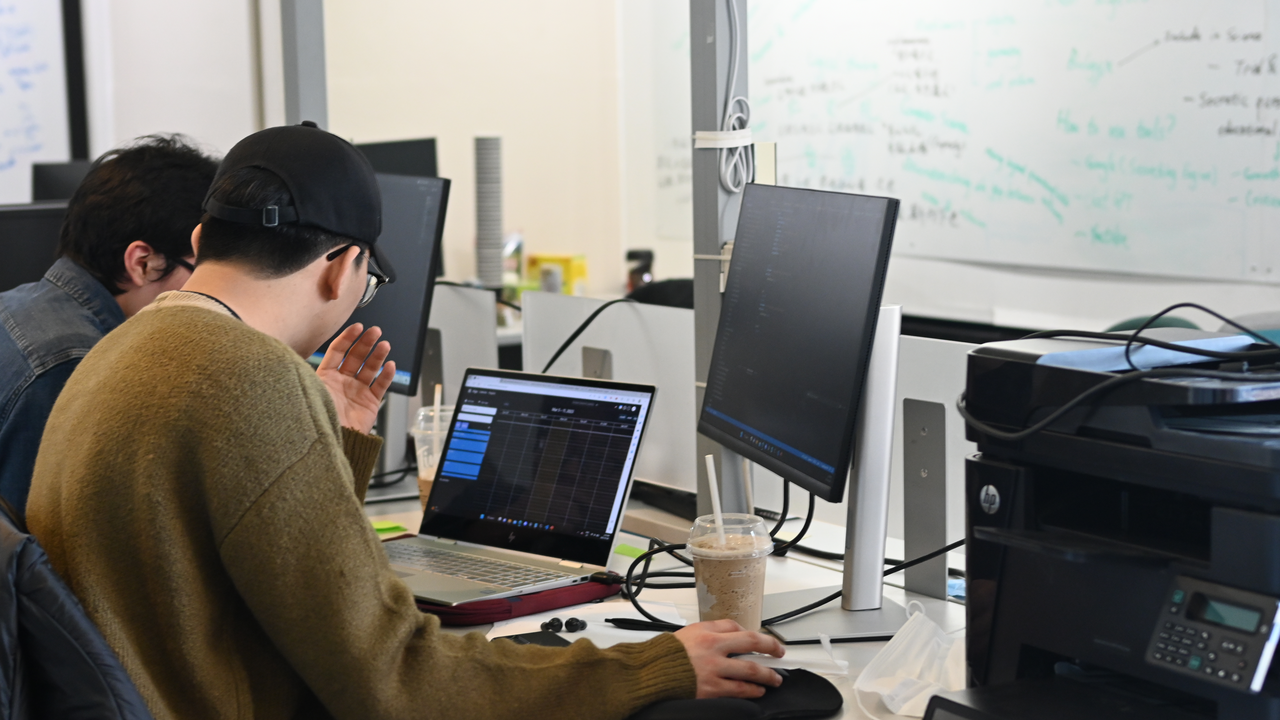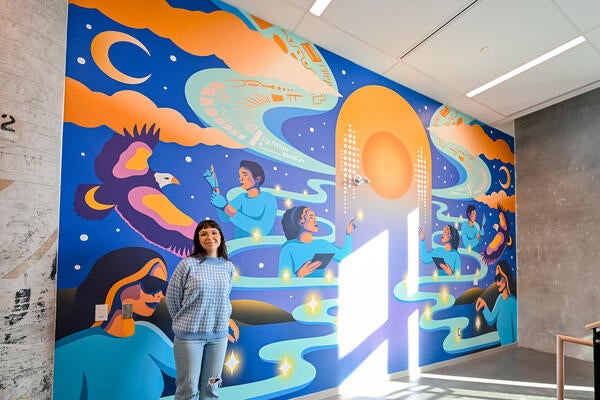
Catching the AI wave
Velocity Digital teams inspired to solve pressing problems using artificial intelligence

Velocity Digital teams inspired to solve pressing problems using artificial intelligence
By Naomi Grosman VelocityStudents at Velocity Digital are bullish about artificial intelligence.
More than 35 per cent of the cross-disciplinary teams engaged in Velocity Digital, the South Campus Hall creator space, are using artificial intelligence in multiple ways, recognizing its power as a tool to solve problems at a capacity beyond the capabilities of human analysis of data.
Arshnoor Sekhon, a third-year undergraduate student in Health Sciences, is working in Velocity Digital to realize the idea behind Ares Intel, a platform using advanced, proprietary algorithms to predict global conflicts and monitor hot spots by scanning the internet. Sekhon’s interest in artificial intelligence stems from his family history — having a grandfather who worked in health sciences and family members touched by illness.
“What would have taken my grandpa 10 million dollars, a team of researchers and lab staff and two to three years to decode … an AI algorithm can now do in three days,” Sekhon says. “Exponential progress in health care, that’s what AI can do. The only reason some of my loved ones are still here today is because of the miracle of modern medicine and science and I want to explore new frontiers with the new tools at hand.”
Osose Itua, founder of Foodage Inc., Velocity $5K winner, and soon-to-be graduate of Mechatronics Engineering with an option in Artificial Intelligence, uses AI to analyze trends in data to make accurate predictions for restaurants with the aim of reducing the industry’s food waste.
Humans can analyze data trends and make predictions, just not very well, she says.
“The possibilities of AI get bigger every day it seems and that’s why I got interested in it a couple of years ago — I saw that it was becoming a big thing and something that would eventually play into all industries,” Itua says. “I thought that was interesting because it has so many different applications.”
Andy Lee is a second-year undergrad in Computer Science, and is working on Algo with Andy Kim, a third-year statistics undergraduate student, and Anikait Lakhotia, a first-year honours mathematics undergraduate student.
The team is building an AI assistant combining project management, calendar and messaging apps into a single platform that provides analytics.
He says the data sets on which you can train AI and the insights it can yield are beyond the prowess of a single individual.
“The best aspect of AI is that you can train a large set of data that a normal human will not be able to comprehend,” Lee says. “For me the benefit of AI comes from that — it can go through large data sets … and provide cohesive recommendations to improve on any area.”
Richard Yao, a third year Accounting and Financial Management undergraduate student, fell into the world of artificial intelligence after being approached by his teammate and friend James Jordan, a first-year Software Engineering undergrad.
They are now working on Evoke, a cloud-based, open-source AI model for app developers.
Evoke is solving an immediate problem using artificial intelligence, enabling developers to run programs on the cloud they can’t run on a personal computer. But Yao’s sentiment towards AI is broader than that.
“I think [AI] is a large frontier that has a large potential to change the future,” Yao said. “In the open-source community … the models are very large, that’s why it’s hard to host on your own computer. We are offering these services by hosting it on cloud servers
A creator space for community building
While Velocity Digital is set up for students to work on their ideas at any stage with resources for software development, building hardware and a 5G network, for some it has become much more than that.
Sekhon had the idea for Ares Intel but as a Faculty of Health student, wasn’t sure where to turn.
“The only thing that held me back was I thought [Velocity] would be full of tech and computer science [students], but you’ll be amazed … I'm like a fish in water,” he says. “Whenever you have a question or a new idea, no-one ever laughs at you or criticizes, they bend over backwards to help you — as long as you are solving a problem, Velocity is the right place to be.”
Visit Velocity’s website for more information on Velocity Digital, other creator spaces and programs.

Read more
Four student teams received a total of $20,000 in grants to further develop startups

Read more
Velocity startup secures foundation with $2M pre-seed round

Read more
Many Hearts, One Mind by Indigenous artist Alanah Jewell celebrates the act of creation shared by the Land and innovators in our community
The University of Waterloo acknowledges that much of our work takes place on the traditional territory of the Neutral, Anishinaabeg, and Haudenosaunee peoples. Our main campus is situated on the Haldimand Tract, the land granted to the Six Nations that includes six miles on each side of the Grand River. Our active work toward reconciliation takes place across our campuses through research, learning, teaching, and community building, and is co-ordinated within the Office of Indigenous Relations.